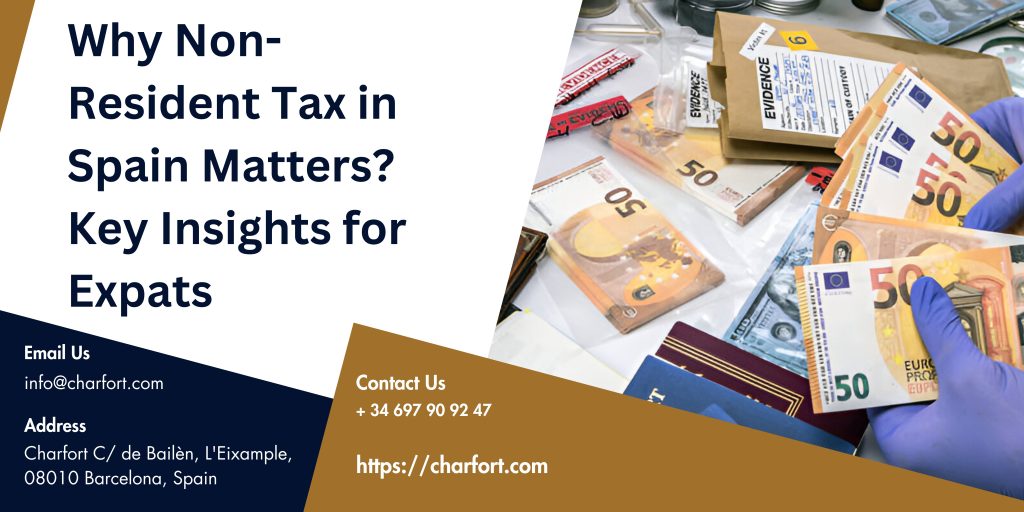
Non-resident tax in Spain can feel like a confusing topic for anyone living abroad or earning income in Spain but residing elsewhere. If you are a non-resident and still have financial ties to Spain, understanding how Spain taxes non-residents is essential to avoid legal issues or unnecessary financial stress. In this guide, we’ll break down the key elements of non-resident tax in Spain, how it applies to different situations, and what it means for expats, foreign workers, and others. Whether you’re already living abroad or considering moving, understanding the tax rules can save you time and money in the long run.
Who Needs to Pay Non-Resident Tax in Spain?
Understanding the non-resident tax obligations in Spain is crucial for anyone considering investing, owning property, or conducting business in the country. This guide will clarify who is required to pay non-resident tax and the implications for foreign nationals.
Definition of Non-Residents
In Spain, a non-resident is defined as an individual who does not spend more than 183 days in the country within a calendar year. This group includes foreign citizens who own property, engage in business activities, or have financial interests in Spain. Non-residents are subject to different tax regulations compared to residents, making it essential to grasp the specifics of their tax obligations.
Tax Obligations for Non-Residents
Non-residents must pay taxes on any income generated within Spain. This includes:
- Rental Income: If you earn income from renting out a property in Spain, you are required to declare this income and pay taxes accordingly.
- Dividends and Interest: Any dividends received from Spanish companies or interest earned from Spanish banks must be declared and taxed.
- Capital Gains: Non-residents are subject to taxes on capital gains from selling property or other assets located in Spain.
It is important for non-residents to file annual tax returns and ensure that they comply with the relevant tax rates for their income types.
Non-Resident Property Owners
Foreign property owners are a significant segment of non-residents who must fulfill tax obligations. Here’s what you need to know:
- Rental Income Tax: If you rent out your Spanish property, you must pay taxes on the income generated. The tax rate varies based on whether you are a resident or non-resident.
- Imputed Income Tax: Even if your property is not rented out, non-resident property owners are subject to an annual tax based on the property’s value, known as imputed income tax. This is calculated on the property’s cadastre value.
Foreign Investors
Foreign investors earning income from Spanish sources need to be aware of their tax liabilities:
- Tax on Investment Income: Non-residents must declare and pay taxes on income earned from investments in Spain, including dividends, interest, and capital gains from the sale of properties or securities.
- Consultation with Tax Professionals: Navigating Spanish tax laws can be complex, so it’s advisable for foreign investors to seek guidance from tax professionals to ensure compliance and optimize their tax situations.
In summary, non-resident tax in Spain impacts a diverse group of individuals and entities, including foreign property owners and investors. Understanding your tax obligations is vital for legal compliance and to avoid penalties. If you are a non-resident considering property investment or other financial activities in Spain, it is essential to consult with a tax professional. At Charfort, we can help guide you through the process, ensuring you meet all your tax requirements while making the most of your investment in Spain.
Non-Resident Tax Calculation in Spain
When you’re a non-resident in Spain, understanding how taxes work can feel a bit overwhelming. Whether you own property or earn income from Spanish sources, it’s crucial to know how non-resident tax is calculated. Let’s simplify this process so you can manage your obligations without stress.

Non-Resident Tax Overview
Non-resident tax applies to anyone who spends less than 183 days in Spain during a calendar year. As a non-resident, you are taxed only on income earned in Spain, not on your worldwide income. This means if you rent out a property or have investments in Spain, you’ll need to pay taxes on those earnings.
Types of Taxable Income
Different types of income have distinct tax implications. If you’re renting out property, that income is subject to a flat tax rate. For non-EU residents, the rate is 24%, while EU residents benefit from a lower rate of 19%. This flat rate makes it easier to calculate how much you owe because you don’t have to deal with different tax brackets.
If you sell property in Spain, you’ll need to pay capital gains tax. For non-residents, the capital gains tax is 19%. To figure out your taxable gain, you subtract the original purchase price and any related costs—like renovations or real estate fees—from the sale price.
Deductions for Non-Residents
Even as a non-resident, you can take advantage of some deductions. For rental income, you can deduct expenses related to maintaining the property, property management fees, and mortgage interest. These deductions can help lower your taxable income and, ultimately, your tax bill.
The range of deductions you can claim might vary based on your residency status. EU residents often have access to more deductions, so it’s worth reviewing what you can claim to ensure you’re not leaving money on the table.
Filing Your Non-Resident Tax Return
Every year, you must file a non-resident income tax return, known as Form 210. This is your opportunity to report the income you earned in Spain. The deadlines for filing are crucial—returns are due on the 20th of April, July, October, and January for each quarter.
Make it a habit to keep track of your income and expenses throughout the year. This will help you file accurately and avoid penalties. Filing might seem like a chore, but staying organized will make it much easier.
If you have any questions or need assistance with your non-resident tax situation in Spain, Charfort is here to help. We can guide you through the process, ensuring that your property investment in Spain is as smooth as possible. Reach out anytime for support!
Types of Income Subject to Non-Resident Tax in Spain
If you’re a non-resident in Spain, it’s essential to know what types of income will be taxed. Whether you’re earning from property, investments, or other sources, each category has specific tax rules. Let’s break down the types of income that fall under non-resident tax obligations in Spain.
Rental Income
If you own a property in Spain and rent it out, the income you earn is subject to non-resident tax. This includes both long-term rentals and short-term vacation rentals. For non-EU residents, the tax rate on rental income is 24%, while EU residents benefit from a reduced rate of 19%. The good news is that you can deduct certain expenses from your rental income, such as maintenance costs, property management fees, and mortgage interest. These deductions can help lower your overall tax bill, so be sure to keep track of all your related expenses.
Capital Gains from Property Sales
Selling a property in Spain as a non-resident also has tax implications. When you sell a property, you’ll be taxed on any profit you make, known as capital gains. Non-residents are taxed at a flat rate of 19% on these gains. To calculate your taxable profit, subtract the original purchase price and any related costs, like renovations and selling expenses, from the sale price. This means that if you’ve put money into improving your property, those costs can help reduce your taxable gain.
Dividends and Interest
If you receive dividends from Spanish companies or earn interest from Spanish bank accounts, this income is also subject to non-resident tax. Dividends are taxed at a rate of 19%, while interest income from Spanish banks is generally taxed at the same rate. This applies to both EU and non-EU residents, making it crucial to factor these earnings into your tax calculations if you have investments in Spain.
Business Income
If you run a business in Spain as a non-resident, any income generated from that business will be taxable. This can include income from freelance work, consulting, or any other services you provide. The tax rate for business income will generally follow the same structure as other non-resident income, with a flat rate of 24% for non-EU residents and 19% for EU residents. Make sure to keep accurate records of your business expenses, as these can often be deducted from your taxable income.
Other Sources of Income
Additionally, non-residents may be taxed on other types of income earned in Spain. This includes income from pensions, annuities, or certain investment returns. Each type of income may have its own specific tax rate and deductions, so it’s essential to consult with a tax professional or review Spanish tax laws to ensure you’re compliant and taking advantage of any available benefits.
Keeping track of your earnings and related expenses will help you file accurately and potentially reduce your tax bill. If you have any questions or need assistance with your tax situation, Charfort is here to help you navigate these requirements!
Deductions and Exemptions Available for Non-Residents in Spain
As a non-resident in Spain, it’s true that you won’t enjoy all the tax benefits that residents do, but there are still some deductions and exemptions you can take advantage of. Understanding these can help you reduce your overall tax burden and make your investment more manageable. Let’s explore what deductions and exemptions are available for non-residents in Spain.

Deductions for Rental Income
If you’re renting out property in Spain, you can claim several deductions related to your rental income. While non-residents are subject to a flat tax rate on this income, these deductions can lower the amount you ultimately pay. Eligible expenses include:
- Maintenance and Repairs: Any costs associated with maintaining your property, such as plumbing repairs or painting, can be deducted.
- Property Management Fees: If you hire a property management company to handle your rentals, their fees can also be deducted from your taxable income.
- Utilities: If you cover utility costs for your tenants, you can deduct these expenses as well.
- Mortgage Interest: The interest paid on your mortgage can also be claimed, reducing your taxable rental income.
It’s essential to keep thorough records and receipts for all these expenses to ensure that you’re accurately reporting your deductions.
Deductions for Business Income
If you earn income from a business operating in Spain, you may also qualify for certain deductions. Similar to rental income, you can deduct necessary business expenses that help generate your income. These might include:
- Operating Expenses: This includes costs like office supplies, travel expenses, and marketing.
- Employee Salaries: If you have employees in Spain, their salaries can be deducted as well.
- Professional Fees: Fees paid to accountants, consultants, or legal advisors can also be deducted from your business income.
Again, keeping detailed records of these expenses is vital for accurate reporting.
Capital Gains Tax Exemptions
While non-residents pay capital gains tax when selling property in Spain, there are a few exemptions you should know about. For instance, if the property being sold is your primary residence and you meet specific conditions, you may be exempt from capital gains tax on the sale. However, this generally applies to residents, so it’s essential to check if you qualify based on your situation.
Inheritance and Donation Tax
Non-residents in Spain are also subject to inheritance and donation taxes, but there are some exemptions available. If you inherit property or receive a gift, certain amounts may be exempt from taxation. The exact exemptions depend on the region in Spain where the property is located and the relationship between the donor and recipient. For example, immediate family members might receive more favorable tax treatment than distant relatives or unrelated individuals.
If you have questions about your specific tax situation or need help navigating the complexities of non-resident tax in Spain, Charfort is here to assist you. We can provide guidance tailored to your needs, ensuring you make the most of your investment while complying with local tax laws.
FAQs
Who needs to pay non-resident tax in Spain?
If you spend fewer than 183 days in Spain per year but have income or assets in Spain (such as property or investments), you will need to pay non-resident tax. Non-residents include people living abroad who receive Spanish income or have properties in Spain.
How is non-resident tax calculated in Spain?
Non-resident tax is typically calculated as a flat rate. For non-EU citizens, the tax rate is 24% on income earned in Spain, while for EU citizens, the rate is 19%. The type of income you earn, such as rental income or dividends, will determine the exact amount of tax you need to pay.
What income is subject to non-resident tax in Spain?
Non-resident tax applies to any income earned from Spanish sources, including:
- Rental income from Spanish properties
- Employment income (if linked to Spain)
- Dividends from Spanish investments
- Capital gains from selling Spanish property
Are there any deductions for non-residents?
Deductions for non-residents are limited, especially for non-EU citizens. EU residents may be eligible for deductions related to rental property or specific income categories, but generally, non-residents have fewer tax benefits compared to residents.
Conclusion
Paying non-resident tax in Spain can seem daunting, but with the right knowledge and planning, it becomes manageable. By understanding who needs to pay, how to calculate your tax, and the steps to file, you can stay compliant and avoid any legal trouble. If in doubt, consult an expert in Spanish tax law, or use a Spanish income tax calculator to help guide your decisions. Whether you’re dealing with rental income, investment earnings, or employment wages from Spain, being prepared will save you from potential headaches down the road.

